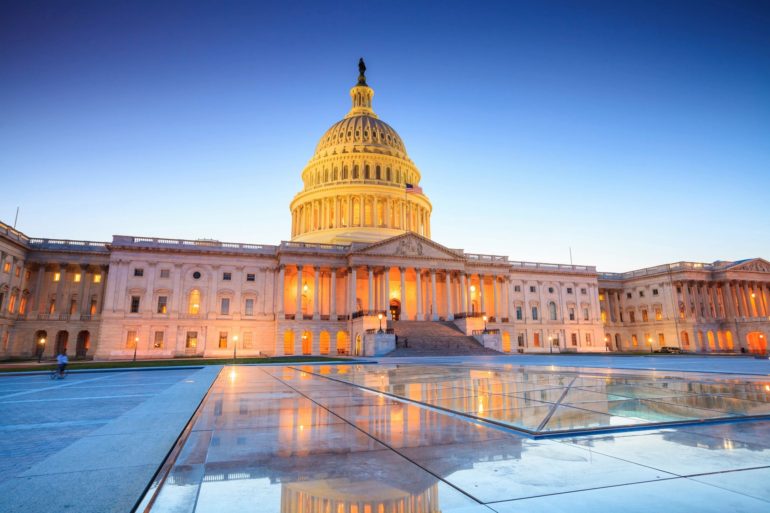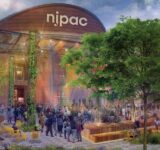By Michael G. McGuinness
 In a rare bipartisan showing, on July 28, the U.S. Senate voted 67-32 to begin formal consideration of a nearly $1 trillion national infrastructure plan, acting quickly once the White House and a bipartisan group of senators finally agreed to major elements of President Joe Biden’s agenda. Based on a reading of the White House Fact Sheet, this could include billions of dollars for the Hudson River tunnel project, part of $66 billion designated to “eliminate the Amtrak maintenance backlog, modernize the Northeast Corridor and bring world-class rail service to areas outside the Northeast and Mid-Atlantic.” Funding is also anticipated for ports and airports, electric vehicle charging, high-speed internet, clean water, environmental remediation and power grids, which would all be good news for New Jersey. Final passage of this proposal, however, is far from certain.
In a rare bipartisan showing, on July 28, the U.S. Senate voted 67-32 to begin formal consideration of a nearly $1 trillion national infrastructure plan, acting quickly once the White House and a bipartisan group of senators finally agreed to major elements of President Joe Biden’s agenda. Based on a reading of the White House Fact Sheet, this could include billions of dollars for the Hudson River tunnel project, part of $66 billion designated to “eliminate the Amtrak maintenance backlog, modernize the Northeast Corridor and bring world-class rail service to areas outside the Northeast and Mid-Atlantic.” Funding is also anticipated for ports and airports, electric vehicle charging, high-speed internet, clean water, environmental remediation and power grids, which would all be good news for New Jersey. Final passage of this proposal, however, is far from certain.
We can likely all agree that modern and efficient infrastructure systems are a major factor in real estate development and investment decisions. Such strategic, long-term investments lead to increased opportunities for commercial real estate development and result in stronger job creation and economic growth for our communities. According to the American Planning Association, “well-planned infrastructure projects strengthen communities, boost the economy and expand opportunity. They also promote a return on the public investment, in contrast with unplanned infrastructure that can waste public funds, damage communities and the environment, and otherwise lead to inefficient growth. Looking across the country and the globe we see that the cities and regions that are thriving are those investing in critical infrastructure such as roads, transit, sidewalks, parks and recreation, water, energy, freight and high-speed internet that connect people and goods to economic and social opportunity. At the same time, we know that a poorly designed infrastructure program can inhibit the shared prosperity, economic growth and community development that we all seek. In this area of policy, details matter as much as funding.”
The infrastructure plan would earmark $110 billion for roads and bridges, $39 billion for public transit, $66 billion for passenger and freight rail, $7.5 billion for electric vehicle charging stations, $5 billion for the purchase of electric school buses and hybrids, $17 billion for ports and $25 billion for airports to reduce to reduce congestion, and address maintenance backlogs, $55 billion for water and wastewater infrastructure, $65 billion to expand broadband access, $21 billion to cleanup Superfund and brownfield sites and $73 billion for modernizing the nation’s electric grid. This new funding will be paid for by a combination of $205 billion in unspent COVID-19 relief aid, $53 billion in unemployment insurance aid that was declined by states, $49 billion by further delaying the disbursement of Medicare beneficiary rebates, raising $87 billion in spectrum auctions for 5G services, $13 billion from a tax on chemical manufacturers, $6 billion from selling oil from the Strategic Petroleum Reserve, $28 billion from enforcing tax codes tied to cryptocurrencies and $56 billion from projected economic growth of investments.
The outcome of the national infrastructure plan will set the stage for the next debate over Biden’s much more ambitious $3.5 trillion spending package, a strictly partisan pursuit of far-reaching programs and services including child care, tax breaks and health care that touch almost every corner of American life. Republicans strongly oppose that plan, which would require a simple majority, and may try to stop both. It would be paid for by increasing the corporate tax rate and the tax rate on Americans earning more than $400,000 a year. House Speaker Nancy Pelosi has said that she won’t allow a vote on the infrastructure bill until the Senate passes the $3.5 trillion budget reconciliation bill. Two of New Jersey’s more moderate Congressional Democrats (Mikie Sherrill and Josh Gottheimer) have recently communicated that, given all of the benefits to New Jersey, they would likely vote for the infrastructure bill regardless of any link to the budget resolution bill.
New Jersey officials and stakeholders have spent years seeking the federal funds needed to complete the Gateway project, which includes the new Hudson River tunnel, the most critical infrastructure project in the nation. Upon announcement of the bipartisan infrastructure deal, Gateway spokesman Stephen Sigmund said, “The infrastructure package is good for the Gateway Program and good for the nation.” U.S Sen. Bob Menendez (D-NJ) said, “I am convinced we will get Gateway funding, I am convinced we will build Gateway.”
As for me, I am cautiously optimistic that Congress will do the right thing. Stay tuned!
Michael McGuinness is CEO of NAIOP New Jersey and has led the commercial real estate development association since 1997. NAIOP represents developers, owners, asset managers and investors of commercial, industrial and mixed-use properties, with 830 members in New Jersey and over 19,000 members throughout North America.










